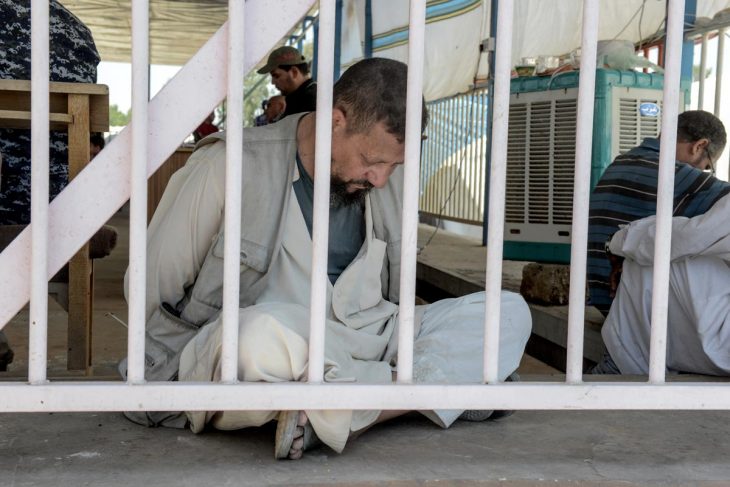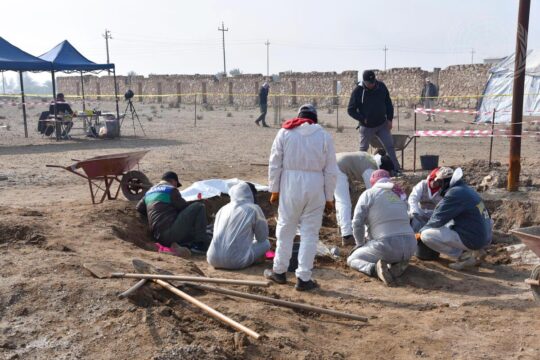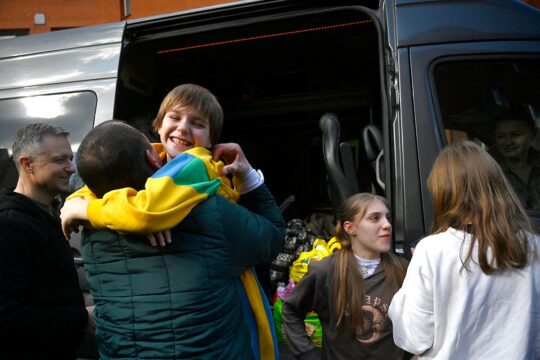A bell sounds. A policeman opens a small wooden door and lets a young man with shaved hair in, his face fallen. The young man walks head down to the dock. A second individual, dressed in a black shirt, follows him and takes the stand. "Put your hand on the Koran. Do you swear to God to tell the truth?" says the judge to the second man, who is about to testify. "Do you know him? Did you see this individual wearing a Daesh [Islamic State] uniform with a gun in his hand?" he continues, pointing to the accused with his eyes. "No. But he disappeared for 18 days and the people in the neighbourhood say he joined a training camp," says the witness, obviously a neighbour of the young man accused of belonging to the terrorist organization during the occupation of Mosul between 2014 and the end of 2016. In the narrow courtroom are the jury, an attorney general, a defence lawyer and a court clerk. The public benches remain empty that day.
After two other similar testimonies and 20 minutes of trial, the young man is acquitted for lack of evidence. The same verdict is reached in the next trial and the next, and all morning at the tribunal in Tel Keppe, a village not far from Mosul. Including the work done by the court in Qayarah before it moved to Tel Keppe, 3,794 people have been released and 3,370 convicted since 2016, according to Raed al-Maslah, investigating judge and president of the counter-terrorism court in the Nineveh plain of northern Iraq. The same magistrate told Human Rights Watch that this court handles the largest number of cases in the country related to Islamic State, with a total of 9,000 cases in 2018 - some of which were dismissed or transferred to other courts.
“an overcrowded prison”
In the corridors, soldiers and lawyers rub shoulders and chat in front of the three main courtrooms. The accused await their turn, squatting, sitting on the ground with their faces turned against the wall. From time to time, the magistrates go out for air or to smoke a cigarette in the courtyard. There are 27 of them working in Tel Keppe, including 11 investigating judges. There are between five and fifteen trials per day. The accused are then released, or return to the prison in the same district, under close surveillance. It is a modern but overcrowded prison, according to Belkis Wille, a researcher for Human Rights Watch (HRW).
The presence of thousands of members of Islamic State (IS) in the Nineveh Plain represents a real danger to the Iraqi State. Most of them have been arrested, convicted or are still awaiting trial. This is a major challenge to which the country's authorities and judicial system do not always respond in a way that respects the rights of the accused. Multiple acts of torture, aimed at pushing suspects to confess, were recorded during the war against IS and after the liberation of Mosul. A HRW report, dated December 2017, considers that convictions are regularly based on very weak evidence, unclear and insufficient testimony.
Computer information provides more evidence
The Tel Keppe court is trying to make improvements. Raed al-Maslah explains that the investigators have found more IS data, which provides physical evidence. "Daesh functioned as a State. We found salary slips, registration documents, more than eight terabytes of computer data," he explains, displaying in his hand a hard disk that belonged to IS.
Judge Raed al-Maslah exposes some examples of data from the Islamic State seized by investigators
Video : Meethak Al-Khatib for JusticeInfo.net
"When an individual is accused of joining Daesh, we conduct a field investigation and go to meet the neighbours or a mukhtar, the local community leader, to get more information," says the president of the Tel Keppe court, explaining another improvement. In addition, now at least two or even three witnesses are required to convict an accused person, compared with only one in 2017. Iraqi justice also has to deal with false accusations and testimonies to which many Iraqis resort for personal ends.
Fewer suspects tortured, says a lawyer
Ahmed, a private lawyer hired by the government to defend the accused, confirms: "I have been working here for six months and I have seen a clear improvement in the rights of my clients. For example, cases of torture are much less frequent." Despite these efforts, detention conditions and investigation procedures remain opaque. "There is no evidence that the authorities are no longer torturing," says Belkis Wille.
It is the end of the day, the last trial in Tel Keppe. On trial is a 22-year-old suspect wearing a football jersey faded and soiled by a year's detention, the time it has taken to gather all the evidence and witnesses needed for the trial. The prosecutor reads the charges against the young man. He melts into tears. His father, who had joined Daesh, was killed by a missile during the war. A witness accuses the son of also joining the terrorist group in 2014, which the defendant denies. He claims that he was a student and that his accuser was a rival at school, which explains these false accusations. The leader of the local community is called to the bar. "We all knew that his father joined Daesh," he says. "But this young man, I've never seen him carry a gun." A man wearing a red and white keffiyeh testifies in turn: "He was a good student and there was a quarrel between the two boys." The jury consult. Five minutes pass, everyone takes their place under the bright lights. The judge declares shortly: "Under Iraqi criminal law, you are acquitted.”






